Traveling to an Ironman Triathlon event can be a mentally stressful experience when you are not used to it. The long flights, unfamiliar surroundings, and new routes can leave even the most seasoned athletes feeling vulnerable. Plus, the adrenaline of participating in such an epic event, and it’s no wonder anxiety can creep in. However, with the right mental preparation, this intimidating task can be transformed into a manageable and enjoyable journey.
Triathletes participating in an Ironman Triathlon require extensive physical training, but mental preparation is equally important, especially when it comes to travel. With the right mental preparation, athletes can reduce stress and anxiety, improve their performance, and enhance their travel experience.
With this blog post, we aim to explore the importance of mental preparation for Ironman Triathlon travel, while also giving you practical techniques to help control the mind, channeling energy towards productive thoughts and emotions, ensuring a focused and calm state of being.

Mental Preparation for Ironman Triathlon Travel
Traveling for an Ironman Triathlon demands a lot from a triathlete. We are talking about mental and physical demand that isn’t exclusive to race prep. There is also a lot of stress linked to the travel itself.
We are here to help you with the mental preparation aspect of international travel for an Ironman Triathlon event. What follows are some tips and strategies on how you can mentally prepare for an Ironman Triathlon travel.
Understanding the travel demands of an Ironman Triathlon
The first step in preparing mentally for Ironman Triathlon travel is understanding the travel demands of the race. These demands include the planning and time commitment required for travel, as well as the physical and mental exhaustion that can result from long flights and significant time zone changes.
Understanding these demands will allow you to prepare yourself mentally for the task ahead and help you start coming up with a plan to deal with them.
From researching race locations and booking flights to arranging accommodations and transportation, each detail requires careful attention. Proper planning and organization are crucial to ensure a smooth travel experience and reduce any stress associated with this stage of Ironman travel.
Physical and Logistical Challenges of Travel:
Long-Distance Travel: Ironman Triathlons often require athletes to travel long distances to reach the race location. This involves extended periods of sitting during flights, potential jet lag, and adjusting to different time zones.
Equipment and Gear: Triathletes must navigate the logistical challenges of transporting their equipment and gear safely. Ensuring everything is packed appropriately and arrives intact adds an additional layer of stress to the travel process.
Impact of Travel on Performance and Mental State:
Fatigue and Recovery: Travelling for an Ironman Triathlon can leave athletes feeling physically and mentally fatigued. The lack of quality sleep, disrupted routines, and the stress associated with travel can impact recovery and weaker your performance.
Mental Stress and Focus: The demands of travel can create mental stress and distractions, affecting an athlete’s ability to stay focused. Preoccupation with logistics, unfamiliar surroundings, and being away from home can contribute to increased stress levels and diminished mental clarity.
Need for Adaptability and Resilience during Travel:
Embracing Change: Travelling for an Ironman Triathlon requires a mindset of adaptability and embracing change. Triathletes must be prepared to navigate unexpected delays, unfamiliar environments, and unforeseen challenges with resilience and a positive outlook.
Flexibility in Training: Travel disrupts regular training routines, and athletes must be adaptable in adjusting their training plans to accommodate travel schedules. This flexibility helps maintain physical fitness and mental preparedness.
Problem-Solving Skills: Effective problem-solving skills are essential during travel. Triathletes should be prepared to find solutions to unforeseen situations, such as changes in transportation or unexpected weather conditions while staying calm and focused.
Building a travel itinerary
Building a travel itinerary that allows for ample time to adjust to the time zone, explore the race course and surrounding areas, and settle into the accommodations can be helpful in reducing stress and anxiety.
Arriving at the race location in advance of the race also provides athletes with an opportunity to acclimate to the climate and time difference, which can help improve performance on race day.
Here are some examples of what you can do to be prepared for the travel demands of an Ironman Triathlon:
- Plan Ahead and Prioritise: Start by preparing a detailed travel plan. Research the race location, including transportation options, nearby accommodations, and local amenities.
- Allocate Ample Time: Allow sufficient time for travel, especially if you’re flying to a different time zone. Arrive at the race destination a few days in advance to acclimate to the new environment and adjust to any time differences.
- Pack Smart: Make a checklist of essential items to pack, including race gear, nutrition supplies, comfortable clothing, and any required medications.
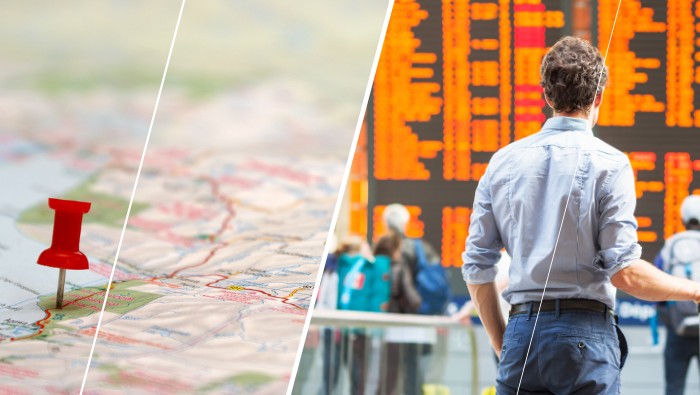
Mental Strategies for Travel
Mental preparation strategies, such as positive visualization, relaxation techniques, and mindfulness practices, can help athletes manage the stress and anxiety of Ironman Triathlon travel.
Positive visualization: A positive visualization is a powerful tool that can help athletes mentally prepare for Ironman Triathlon travel. Visualize the entire travel process, from packing your bags to arriving at the race destination, as smooth and effortless.
Imagine yourself feeling calm, focused, and confident during the journey. Visualise successful adaptation to new environments and a strong performance on race day. Regularly practicing positive visualization techniques can create a positive mindset, reduce anxiety, and boost confidence.
Relaxation techniques: Travelling for an Ironman Triathlon can be stressful, but incorporating relaxation techniques into your routine can help manage stress effectively.
Here are some techniques to consider:
- Deep Breathing: Practise deep, diaphragmatic breathing to calm the mind and relax the body. Breathe in slowly through your nose, hold for a few seconds, and exhale slowly through your mouth. Focus on the sensation of your breath, letting go of any tension or worries with each exhale.
- Progressive Muscle Relaxation: Systematically tense and relax each muscle group in your body to release tension and promote relaxation. Start from your toes and work your way up to your head, consciously tensing and then releasing each muscle group.
- Guided Imagery: Listen to guided imagery recordings or create your own mental imagery to transport yourself to a peaceful and serene place. Visualize yourself in a tranquil setting, such as a beach or a peaceful forest, and immerse yourself in the sensory details of that environment.
Mindfulness practices: Embrace the present moment by cultivating mindfulness. Be aware of your thoughts, feelings, and sensations without judgment.
Here are a few mindfulness techniques to consider:
- Meditation: Dedicate a few minutes each day to meditation. Find a quiet space, sit comfortably, and focus your attention on your breath or a specific point of focus. When thoughts arise, acknowledge them without judgment and gently bring your focus back to the present moment.
- Body Scans: Perform body scans to bring awareness to each part of your body. Start from your toes and gradually move up to your head, paying attention to any sensations or areas of tension. This practice helps promote relaxation and body awareness.
- Mindful Eating: Pay close attention to your food choices and eating habits while traveling. Take the time to savor each bite, noticing the flavors, textures, and aromas. Eating mindfully nourishes your body and promotes a sense of gratitude and enjoyment.
Benefits of Mental Preparation for Ironman Triathlon Travel
Mental preparation for Ironman Triathlon travel offers numerous benefits for athletes, including reduced stress and anxiety, improved performance, enhanced travel experience, and long-term benefits for mental health and well-being.

Reduced stress and anxiety
Preparing your mind for the challenges that lie ahead can significantly alleviate the stress and anxiety associated with an Ironman triathlon. By incorporating mental preparation techniques into your training routine, you cultivate resilience, composure, and a sense of inner calm.
Visualization exercises, mindfulness techniques, and positive self-talk empower you to face the race day with confidence, easing nerves and reducing pre-competition jitters. Mental preparation helps you maintain focus, control negative emotions, and embrace the race as an exciting opportunity rather than an overwhelming obstacle.
Improved performance
The mind is an athlete’s most potent tool, capable of elevating performance to unparalleled heights. Mental preparation for Ironman triathlon travel enhances your ability to set goals, stay motivated, and push beyond perceived limits.
By visualizing successful race scenarios and practicing mental imagery, you train your mind to synchronize with your body, creating a harmonious connection that optimizes performance. Mental preparation equips you with coping strategies to overcome setbacks, sustain concentration during grueling sections, and tap into your hidden reserves of strength and determination when fatigue sets in.
Enhanced travel experience
Ironman triathlon travel is more than just a race – it’s an adventure that takes you to breathtaking destinations, exposes you to different cultures, and offers unforgettable experiences. Mental preparation enables you to fully immerse yourself in the journey, allowing you to savor the vibrant locales, connect with fellow athletes, and embrace the local customs.
By cultivating a positive mindset and a sense of gratitude, you elevate your travel experience, fostering deeper connections and creating lasting memories that go beyond the race itself. Mental preparation encourages you to approach your trip with an open heart, making each moment an opportunity for growth and self-discovery.
Long-term benefits
The benefits of mental preparation extend far beyond the race day, impacting your overall well-being in the long run. The techniques and strategies you develop during your Ironman triathlon travel journey translate into various aspects of your life.
Improved stress management skills, enhanced focus and concentration, and a resilient mindset are invaluable assets that can be applied to personal and professional endeavors. Mental preparation cultivates a growth-oriented mindset, fostering self-belief, perseverance, and adaptability – qualities that empower you to overcome challenges and thrive in all areas of life.
Real-World Applications of Mental Preparation for Ironman Triathlon Travel
We’ve talked about the mental preparation needed for travel to an Ironman event, such as the physical demands and we covered some simple tips to help you manage the stress and the benefits that come with it.
Yet we still feel that this is not enough, so we have some more tips to help better you implement these mental preparation strategies in the real world. Here are a few examples of how mental preparation strategies can be applied to an Ironman Triathlon travel:
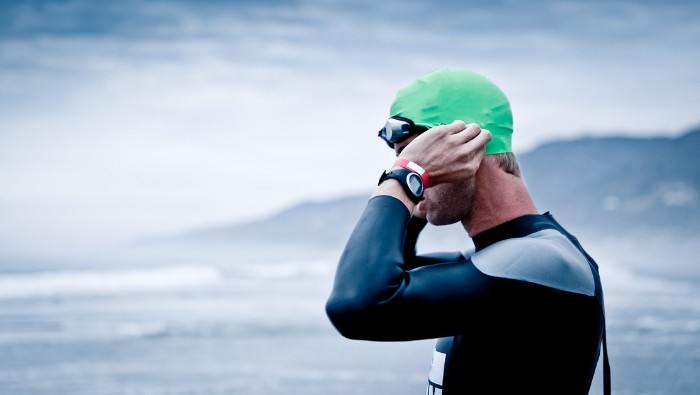
Managing pre-race nerves
Many athletes experience pre-race nerves before an Ironman Triathlon, which can be worsened by travel. By engaging in relaxation techniques such as deep breathing, meditation, and progressive muscle relaxation, athletes can calm their nerves and reduce anxiety, allowing them to focus on their performance.
Staying focused during travel
Long flights and time zone changes can leave athletes feeling exhausted and unfocused. By practicing mindfulness techniques such as staying present and focused in the ‘’now’’, athletes can stay centered and focused during travel, allowing them to arrive at the race location feeling refreshed and ready to go.
Meditation for Inner Strength
Meditation is a powerful practice that strengthens the mind and enhances focus, making it a valuable tool for Ironman Triathlon travel. Take a few moments each day to sit in a quiet space, close your eyes, and focus on your breath.
Allow thoughts to come and go without judgment, cultivating a sense of inner calm and mental clarity. By incorporating meditation into your routine, you develop resilience, cope with stress better, and stay grounded amidst the traveling chaos. Start with just a few minutes daily and gradually increase the duration to experience its full benefits.
Visualization for Race Success
Visualization is a technique used by top Ironman competitors to mentally practice success. Close your eyes and imagine yourself crossing the finish line, feeling the exhilaration, and embracing the achievement like you were there now.
Visualize each part of the race, from swimming to biking and running, seeing yourself navigate the course with confidence and grace. Engage all your senses and experience the emotions associated with success. Regular visualization trains your mind for triumph, boosts confidence, and enhances your performance on race day.
Positive Self-Talk for Mental Resilience
Tackle the power of positive self-talk to cultivate mental resilience during Ironman Triathlon travel. Replace self-doubt and negative thoughts with empowering affirmations. Instead of saying, “I’m not good enough,” reframe it as “I am capable of anything I set my mind to.”
Repeat these affirmations daily, particularly during challenging moments. By rewiring your thought patterns, you build self-belief, boost motivation, and foster a resilient mindset that carries you through the highs and lows of the journey.
Learn from the Pros
Professional Ironman competitors have mastered the art of mental preparation, and their techniques can inspire your own approach. Research successful athletes, read their interviews or books, and discover how they train their minds.
For example, champions often share how they incorporate mindfulness practices, journaling, or visualization into their routines. Study their strategies, adapting them to your personal preferences and needs. By learning from the best, you gain insights that can propel your own performance to new heights.
Build Mental Stamina
Just like physical endurance, mental stamina is a crucial aspect of Ironman Triathlon travel. Gradually build your mental stamina through deliberate challenges. Push yourself to complete longer meditation sessions, tackle more challenging visualization scenarios, and engage in positive self-talk during demanding training sessions.
By progressively increasing the difficulty, you strengthen your mental endurance and cultivate a mindset that thrives on adversity. This mental resilience will serve you well during the red-blooded travel journey.
Enjoy the travel experience
An Ironman Triathlon can be a once-in-a-lifetime opportunity to explore new locations and cultures. By building a travel itinerary that allows ample time to explore the race location and surrounding areas, athletes can enjoy a more leisurely and less stressful travel experience.
So there you have it! Mental preparation is the secret key that can take your Ironman Triathlon travel experience to the next level. Say goodbye to stress and anxiety and hello to a focused and enjoyable journey!
Remember to visualize success, establish a pre-race routine, practice mindfulness, and fill your mind with positive self-talk. By taking action and incorporating these techniques into your training, you’ll be unstoppable on race day.
Get ready to conquer challenges, embrace the adventure, and create lifelong memories. It’s time to unleash your mental power and make your Ironman Triathlon travel a remarkable journey. Let’s do this!

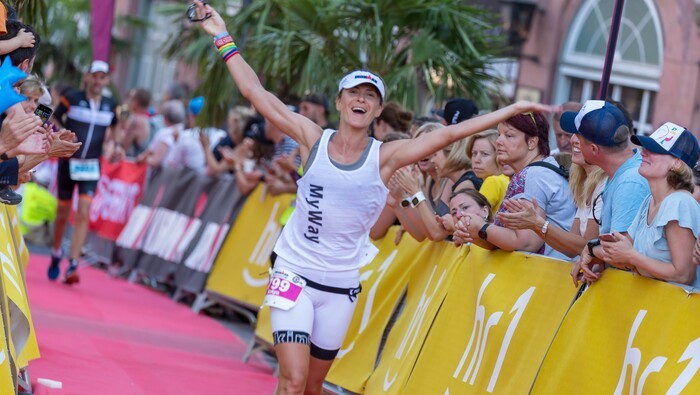

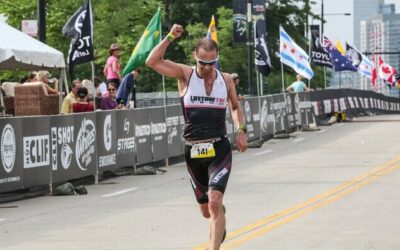
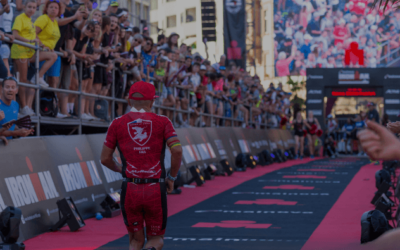
0 Comments